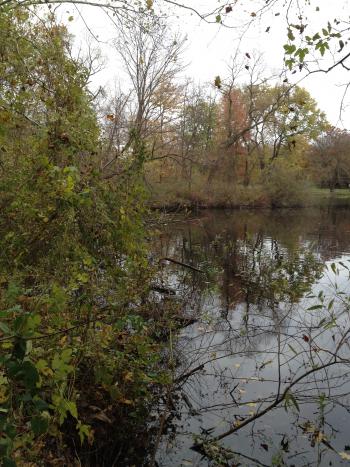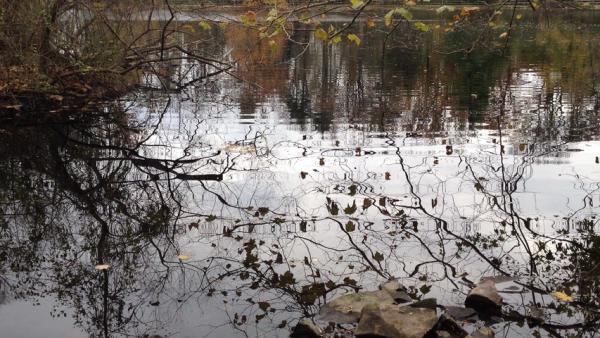Serendip is an independent site partnering with faculty at multiple colleges and universities around the world. Happy exploring!
Sarah Cunningham's blog

at one
My new site, the Haverford duck pond, becomes more and more beautiful. The bird population was up today-- maybe 70-80 geese as well as the usual dozen or two ducks-- and also exceptionally vocal. The ducks go quack quack quack, while the geese make a cry that is both more musical and harsher, more strident. They may have been noisy today because of the human families there feeding them, but it seemed to me to be something else as well. The geese are on the move, and it's an exciting time for them. But really their motivation is way beyond my ability to guess at it. They have their own life.

name storms after oil companies!
This was in an e-mail I received today! (from the Working Families Party)
...
But it’s really not about luck at all, and this is why we’re writing to the many WFP supporters who did not know Jessie or anyone else hurt in this hurricane. A few days ago, an environmental thinker and writer named Bill McKibben made a point worth repeating.
It is time, he wrote, that we stop giving these storms the names of people, and start naming them after fossil fuel companies.
McKibben's point is that global warming makes normal storms into terrible ones, and terrible ones into killers. The oil and coal companies are the biggest contributors to the global warming that causes sea levels to rise and the waters to warm, which in turn boost the awesome, terrible power of a hurricane. They fund the lobbying and political campaigns that guarantee that we do nothing real to challenge climate change. And they fail to accept any responsibility for the death and destruction that result.

A young cousin of mine put this up on Facebook
Thanks to Blair Howell for the following. I thought it might interest you.
While searching for articles, I stumbled across a lovely gem: Therapy Today (2005) "Wild at Heart: Another Side of Ecopsychology". Unfortunately it does not list an author, nor could I find a list of collaborators.

Spring or fall?
Today I was struck by the way the colors could almost be spring rather than fall. We're just at the precise indeterminate balance point... The few remaining greens are thin and sparse, and even the reds and russets have faded to a shade that could be the color of new leaves budding instead of old ones falling. The light, too, in the late afternoon-- a gentler, warmish day today-- could have been a blush of spring. It made me think about my mother. Something about cycles, and an equivalence between the seasons and the ages of (wo)man, so that old age is like the autumn drawing into winter, and just as fall can be mistaken for spring, so too old age has its kinship with childhood. My mother loves her wind-up bunny rabbit that can hop hop hop on the breakfast table: it can keep her entertained for a surprisingly long time. She's 87. And today at lunch, as we were talking about the birds at the bird feeder, species we've never seen before here (a red-bellied woodpecker!) and whether it's to do with climate change that they come further north now, and whether it's a bad thing because we have interfered with nature, and Mother says, "Well, humans are part of nature too. We are part of nature, and, we watch it." A kind of wisdom I would never have expected from her. Well, I didn't realize till I was almost middle-aged that my mother is someone who always kept track of the phases of the moon. "Oh yes, I'm a moon-watcher," she said. Does your mother watch the moon?

Native American connections
The assigned readings by native American writers-- Paula Gunn Allen, Winona LeDuke-- are the ones that excite me the most. I get tingles in my belly, a waking up feeling all over, like, here is the key! This is the thinking we need! The concept of "usufruct" (but this is a Latin word! isn't there some native vocabulary we could use for this?) makes so much more sense than our European based land ownership rules. The earth belongs to itself, and we belong to it, to use wisely and lovingly. The minute an individual "owns" a piece of land, he/she is separated from the rest of their people, their community. (Even the phrase a "piece" of land creates separation, a breaking up of something that is really whole.) So this is not just about our relationship with land, but about our relationship with each other. Could we say that the ways in which our society is broken stem directly from this broken relationship-- violently broken by our (my) ancestors when they arrived here, by our nation as it grew? This horrifies me in a way that also feels healing, like the beginning of cleaning a horribly infected wound. How can we honor and retrieve the way of life that we shattered?
.... If I think about that question for a moment, I can't help thinking, realistically, our own way of life will have to be shattered for that to be possible. Until then, though, can we practice changing our ways, our thinking?

duck pond magic
 Yesterday I went and sat on a bench by the Duck Pond for quite a while, entering into the richness of the site. Then I went and sat close to the water for a while, where there are strange hobbit-like things (that's how I feel about them) sticking up out the ground, which I think must be part of the root system of the larch trees. See picture below, if I ever manage to upload it!
Yesterday I went and sat on a bench by the Duck Pond for quite a while, entering into the richness of the site. Then I went and sat close to the water for a while, where there are strange hobbit-like things (that's how I feel about them) sticking up out the ground, which I think must be part of the root system of the larch trees. See picture below, if I ever manage to upload it!
I had my phone with me, and a notebook and pen and pencil, but yesterday I did not use them. Today when I went back I took some photos and two videos of the pond ripples moving over the pond's stillness, mesmerizing. (Did you know that word comes from the name of a person, Mr. Mesmer, who invented hypnotism?). Just now I have spent nearly an hour trying without success to upload one of the videos. Can my words be worth a thousand pictures? I can't even seem to upload a still photo at the moment. YouTube does not seem to be on my side.

How do you like these images?
Quite elegant and thoughtprovoking, I think...
http://www.emptykingdom.com/main/featured/adonna-khare-and-her-pencil/

Adventure at the other Duck Pond
Life has been very complicated lately, very exhausting, very full. I was in two minds whether to change my sit-site, or not: I am not tired of the labyrinth, still want to return there; and at the same time I crave somewhere a bit wilder, more varied in its inhabitants. I was thinking about Morris Woods, or even maybe somewhere on the Haverford campus, nearer where I live. In the end I think the natural course of my life has decided for me. I was wanting a walk this afternoon, called one of our helpers to come and stay with my mom, and set out on my usual route around the Nature Walk (what we used to call it when I was a kid) which encircles the Haverford campus. Today it was a walk rather than a sit. Haverford has more wild space, is overall a bit wilder than Bryn Mawr. I love going through the woods - even though there are almost always lots of runners and walkers, some with dogs or babies, using the path, in that way less wild actually than Morris Woods at Bryn Mawr. Then I come out at the Duck Pond, larger and older than Bryn Mawr's duckpond: we used to skate on it in the wintertime, 50 or more years ago. There is often a heron fishing here, as well as the entertaining societies of ducks and Canada geese. My future sit spot will be at the far side of the duck pond, among silver maples and larch trees, a favorite place to stop and meditate, and dream myself into the depths of the pond, which seems like a gateway to Mother Earth herself.

Dangling
oh, oh, I arrived and first greeted the beech tree, feeling I might end up spending more time with the tree than with the labyrinth itself. The ground under the tree covered with empty beechnut shells. Could we eat beech nuts? What do they have to do with chewing gum? Something, I'm pretty sure. Beech tree creating its own space within, doorways here and there where you don't even have to duck your head to walk in, then you are enclosed by rustling leaves. The tree's bark skin so wrinkly and wrinkles forming circles where a branch once grew, so so like breasts. So enormous. So full and heavy, resting on its roots, resting down through its roots. Bruce said today at Harriton House, that many of the trees that starting growing when this area ceased to be farmland, 80 to 100 years ago, have now begun to reach the end of their lives. How can this be true, when these beech trees are clearly much much older than that? I suppose different species have different life spans - ash live shorter? - but still sometimes it seems as if humans, even supposedly environmentaly minded ones, have some kind of death wish towards trees, they just have to find an excuse to cut them down when they reach a certain size. One worthwhile thing colleges do, around here anyway, is preserve magnificent old trees. Bigger ones than are allowed to remain anywhere else. (I'm withholding judgment on the worth-whileness of the academic endeavor!)



